英语论文素材(人工智能)
ai英语作文素材

The Evolution and Impact of Artificial Intelligence: Opportunities and Challenges Artificial intelligence (AI) has been a subject of fascination and debate for decades, with its potential to revolutionize every aspect of human life. As we step into the 21st century, the advancements in AI technology are becoming increasingly profound, sparking both excitement and concern among the general populace. In this essay, we will explore the evolution of AI, its current applications, and the potential opportunities and challenges it presents for society.**The Evolution of AI**The concept of artificial intelligence dates back to the early days of computing, with pioneers such as Alan Turing envisioning machines that could think and learn like humans. However, it was not until recently that significant breakthroughs in computing power, algorithms, and data availability have enabled the rapid development of AI.The first wave of AI was characterized by rule-based systems that could perform specific tasks but lacked theability to adapt or learn from experience. This wasfollowed by the era of machine learning, where algorithms could learn from vast amounts of data to improve their performance on specific tasks. Today, we are entering the age of deep learning, where neural networks模仿thestructure and function of the brain, enabling AI systems to process and understand complex information in a more human-like manner.**Current Applications of AI**AI is now being applied in a wide range of fields, from medicine to transportation and entertainment. In healthcare, AI systems are being used to diagnose diseases, predict patient outcomes, and even assist in surgical procedures.In transportation, self-driving cars and autonomousaircraft are being developed to reduce accidents andimprove efficiency. In the entertainment industry, AI is being used to create music, art, and even movies.**Opportunities Presented by AI**The opportunities presented by AI are vast and diverse. Firstly, AI has the potential to revolutionize many industries, leading to increased productivity, efficiency,and innovation. Secondly, AI can help address some of the world's most pressing challenges, such as climate changeand global poverty. By analyzing vast amounts of data, AI systems can help us understand complex problems and find solutions that we might not have considered before. Finally, AI can enhance human capabilities, allowing us to perform tasks that were previously impossible or too difficult.**Challenges Presented by AI**However, the rise of AI also presents significant challenges. One of the most pressing concerns is the potential for AI systems to become autonomous and out of human control. If AI systems develop the ability to make decisions independently, there is a risk that they could make mistakes or act in ways that are harmful to humans.Another challenge is the ethical implications of AI. As AI systems become more capable, they will be making decisions that directly affect human lives. How do weensure that these decisions are fair and ethical? Whoshould be responsible for the actions of AI systems? These are questions that we need to grapple with as we move forward with AI development.**Conclusion**Artificial intelligence is poised to revolutionizeevery aspect of human life, presenting both opportunities and challenges. It is crucial that we approach AI development with caution and responsibility, ensuring that its benefits are maximized while minimizing its potential risks. Only by doing so can we harness the power of AI to create a better future for all.**人工智能的演变和影响:机遇与挑战**人工智能(AI)几十年来一直是人们着迷和争论的主题,其潜力能够彻底改变人类生活的方方面面。
人工智能外语作文英语
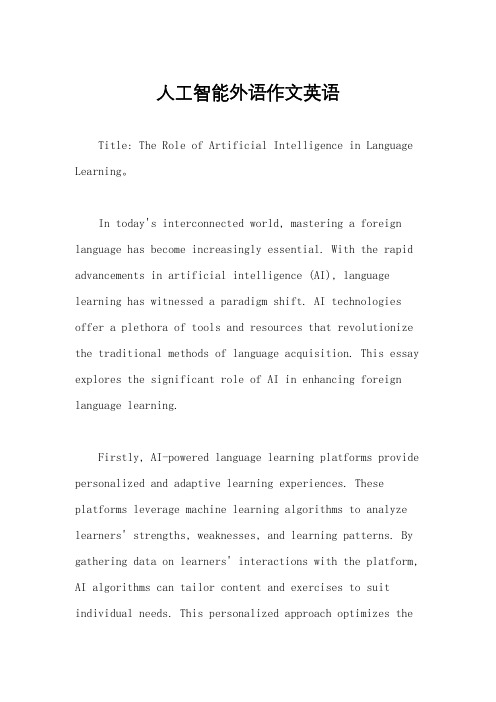
人工智能外语作文英语Title: The Role of Artificial Intelligence in Language Learning。
In today's interconnected world, mastering a foreign language has become increasingly essential. With the rapid advancements in artificial intelligence (AI), language learning has witnessed a paradigm shift. AI technologies offer a plethora of tools and resources that revolutionize the traditional methods of language acquisition. This essay explores the significant role of AI in enhancing foreign language learning.Firstly, AI-powered language learning platforms provide personalized and adaptive learning experiences. These platforms leverage machine learning algorithms to analyze learners' strengths, weaknesses, and learning patterns. By gathering data on learners' interactions with the platform, AI algorithms can tailor content and exercises to suit individual needs. This personalized approach optimizes thelearning process, ensuring that learners receive targeted instruction and practice in areas where they need improvement. Consequently, learners can progress at their own pace, maximizing efficiency and effectiveness.Moreover, AI facilitates immersive language learning experiences through virtual reality (VR) and augmented reality (AR) technologies. These immersive technologies simulate real-life scenarios, allowing learners to practice their language skills in authentic contexts. For instance, VR applications can create virtual environments such as cafes, airports, or markets where learners can interact with AI-powered virtual characters and practice conversations in the target language. Similarly, AR apps can overlay digital content onto the physical world, enabling learners to label objects and receive real-time translations. By immersing learners in lifelike situations, AI-driven VR and AR enhance language acquisition by promoting contextual understanding and cultural immersion.Additionally, AI enables the development of advanced language learning tools, such as speech recognition andnatural language processing (NLP) systems. These tools facilitate speaking and listening practice, two crucial skills in language acquisition. Speech recognition technology accurately transcribes learners' speech and provides feedback on pronunciation and intonation. NLP algorithms analyze written or spoken language, enabling learners to receive instant translations, grammar corrections, and vocabulary suggestions. By leveraging these AI-driven tools, learners can practice speaking and listening in a supportive and interactive environment, thereby improving their oral proficiency and comprehension skills.Furthermore, AI-powered language tutors offer personalized and adaptive instruction to learners. These virtual tutors utilize natural language understanding (NLU) algorithms to comprehend learners' queries and provide relevant explanations and feedback. Unlike traditional language tutors, AI-powered tutors are available 24/7 and can accommodate learners' schedules and preferences. Moreover, virtual tutors can monitor learners' progress over time, adjusting their teaching strategies based onperformance data. This continuous feedback loop ensuresthat learners receive timely guidance and support throughout their language learning journey, fostering motivation and engagement.Despite the numerous benefits of AI in language learning, some challenges remain. One concern is the potential reliance on technology, which may lead to decreased human interaction and communication skills. To mitigate this risk, language learning platforms should incorporate opportunities for collaborative learning and interaction with native speakers. Additionally, ensuring the accuracy and reliability of AI-driven language tools is crucial to prevent misinformation and reinforce correct language usage. Continuous refinement and validation of AI algorithms are necessary to maintain the quality and effectiveness of language learning applications.In conclusion, artificial intelligence plays a pivotal role in transforming the landscape of language learning. By offering personalized learning experiences, immersive simulations, advanced learning tools, and virtual tutors,AI empowers learners to acquire foreign languages more efficiently and effectively. However, it is essential to address challenges such as maintaining human interaction and ensuring the accuracy of AI-driven tools. With further advancements and innovation, AI will continue to revolutionize language learning and empower individuals to communicate and connect across cultures and borders.。
畅想人工智能英语作文素材
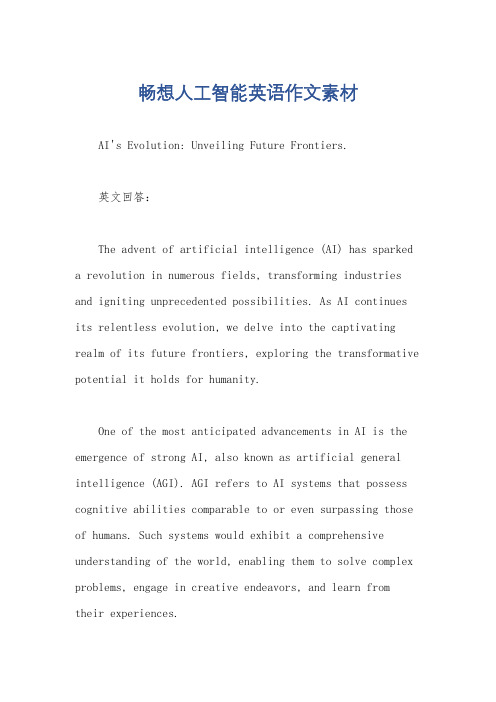
畅想人工智能英语作文素材AI's Evolution: Unveiling Future Frontiers.英文回答:The advent of artificial intelligence (AI) has sparked a revolution in numerous fields, transforming industries and igniting unprecedented possibilities. As AI continues its relentless evolution, we delve into the captivating realm of its future frontiers, exploring the transformative potential it holds for humanity.One of the most anticipated advancements in AI is the emergence of strong AI, also known as artificial general intelligence (AGI). AGI refers to AI systems that possess cognitive abilities comparable to or even surpassing those of humans. Such systems would exhibit a comprehensive understanding of the world, enabling them to solve complex problems, engage in creative endeavors, and learn fromtheir experiences.The development of AGI has the potential torevolutionize industries ranging from healthcare to finance. In healthcare, AGI-powered systems could assist in diagnosing diseases, developing personalized treatment plans, and accelerating drug discovery. Within thefinancial sector, AGI could automate complex tasks, enhance risk management, and provide tailored financial advice.Beyond AGI, the future of AI is brimming with transformative applications. AI-driven robotics is poisedto revolutionize manufacturing, logistics, and healthcare. Autonomous vehicles promise safer, more efficient transportation systems. Natural language processing (NLP) will bridge communication barriers, fostering seamless interactions between humans and machines.AI is also poised to play a pivotal role in addressing global challenges. AI-powered climate modeling systemscould enhance our understanding of climate change and facilitate effective mitigation strategies. AI-driven education platforms could personalize learning experiences,empowering students with tailored educational content.However, the rapid advancement of AI also raisesethical and societal concerns. As AI systems become increasingly autonomous, questions arise regarding accountability, bias, and fairness. Transparent and responsible development practices are crucial to ensurethat AI benefits all of society without exacerbating existing inequalities or creating unintended harm.In conclusion, the future of AI is a kaleidoscope of possibilities, brimming with transformative potential. The advent of strong AI, AI-driven robotics, autonomous vehicles, and advanced natural language processing systems is poised to reshape industries, solve complex problems, and enhance our daily lives. However, it is imperative that we embrace responsible development practices to harness the full benefits of AI while mitigating potential risks.中文回答:人工智能的进化,展望未来疆域。
人工智能优秀英语范文

人工智能优秀英语范文Artificial Intelligence has been a topic of great interest and discussion in recent years. With the rapid development of technology, AI has become an integral part of our daily lives, from personal assistants like Siri and Alexa to autonomous vehicles and advanced medical diagnosis systems. In this essay, I will discuss the benefits and challenges of AI, as well as its potential impact on society.First and foremost, AI has the potential to revolutionize various industries and improve efficiency. For example, in the healthcare sector, AI can analyze large datasets to identify patterns and predict diseases, leading to early diagnosis and personalized treatment plans. In addition, AI-powered robotics can perform complex surgeries with greater precision, reducing the risk of human error. Similarly, in the field of transportation, AI can enhance safety and reduce traffic congestion through autonomous vehicles that can communicate with each other and make split-second decisions.On the other hand, the widespread adoption of AI also raises concerns about job displacement and ethical implications. As AI continues to automate tasks that were previously performedby humans, there is a risk of unemployment and economic inequality. Moreover, the use of AI in decision-making processes, such as loan approvals and criminal sentencing, has sparked debates about bias and fairness. It is essential to address these challenges through policies and regulations that ensure the responsible and ethical use of AI.In addition to its impact on the economy and ethics, AI also has the potential to transform education and personalized learning. With the help of AI, educators can tailor instruction to individual students' needs, providing targeted support and feedback. Furthermore, AI-powered tutoring systems can offer personalized learning experiences, adapting to each student's pace and style of learning. This can lead to improved academic outcomes and a more inclusive education system.In conclusion, the development of AI presents both opportunities and challenges for society. While AI has the potential to revolutionize various industries and improve efficiency, it also raises concerns about job displacement and ethical implications. It is crucial for policymakers, businesses, and individuals to collaborate in addressing these challenges and ensuring the responsible and ethical use of AI.人工智能近年来备受关注和讨论。
人工智能作文素材
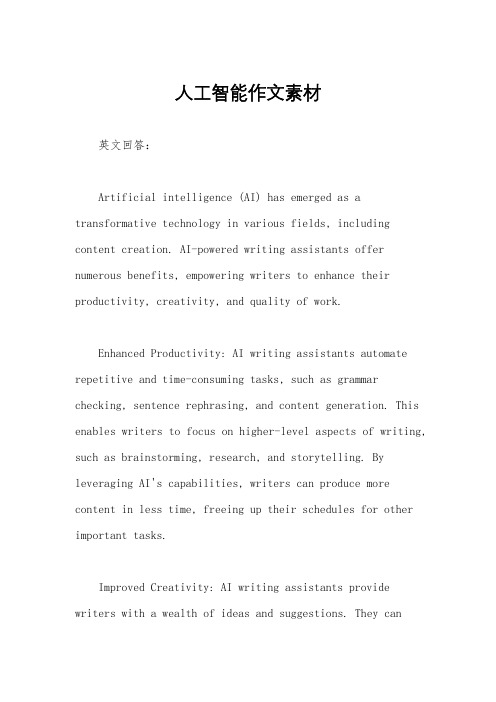
人工智能作文素材英文回答:Artificial intelligence (AI) has emerged as a transformative technology in various fields, including content creation. AI-powered writing assistants offer numerous benefits, empowering writers to enhance their productivity, creativity, and quality of work.Enhanced Productivity: AI writing assistants automate repetitive and time-consuming tasks, such as grammar checking, sentence rephrasing, and content generation. This enables writers to focus on higher-level aspects of writing, such as brainstorming, research, and storytelling. By leveraging AI's capabilities, writers can produce more content in less time, freeing up their schedules for other important tasks.Improved Creativity: AI writing assistants provide writers with a wealth of ideas and suggestions. They cangenerate alternative perspectives, explore unique angles, and break writers out of creative ruts. By exposing writers to a broader range of possibilities, AI stimulates their imaginations and fosters innovative thinking.Enhanced Quality: AI writing assistants ensure consistency and accuracy in writing. They can detect grammatical errors, identify stylistic inconsistencies, and suggest improvements to clarity and readability. By leveraging AI's analytical capabilities, writers can produce high-quality content that meets professional standards and effectively conveys their message.In addition to these benefits, AI writing assistants are also highly versatile and can be used in a variety of writing applications. They can assist with blog post writing, article generation, marketing copywriting, scriptwriting, and even academic writing. By tailoringtheir capabilities to specific writing styles and genres, AI writing assistants empower writers to produce tailored content that meets the unique requirements of each project.Despite these advantages, it's important to note thatAI writing assistants are not a substitute for human writers. They cannot fully replicate the creativity, emotional intelligence, and personal touch that a skilled writer brings to the table. Instead, AI writing assistants serve as valuable tools that can augment a writer's capabilities and enhance the writing process.中文回答:人工智能写作素材。
关于人工智能的英语作文
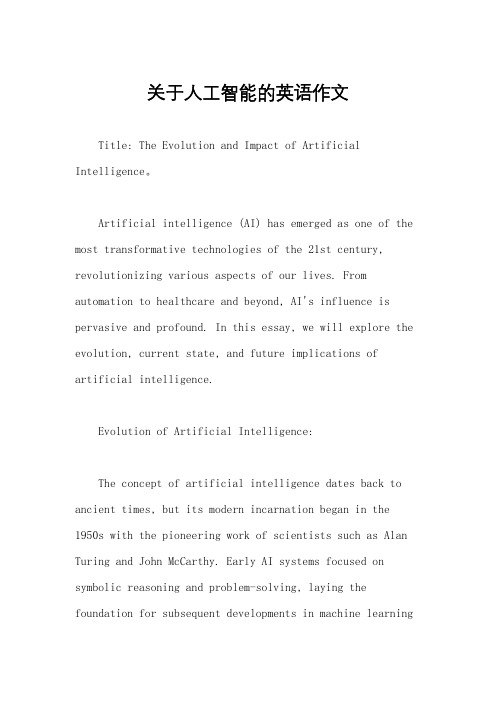
关于人工智能的英语作文Title: The Evolution and Impact of Artificial Intelligence。
Artificial intelligence (AI) has emerged as one of the most transformative technologies of the 21st century, revolutionizing various aspects of our lives. From automation to healthcare and beyond, AI's influence is pervasive and profound. In this essay, we will explore the evolution, current state, and future implications of artificial intelligence.Evolution of Artificial Intelligence:The concept of artificial intelligence dates back to ancient times, but its modern incarnation began in the 1950s with the pioneering work of scientists such as Alan Turing and John McCarthy. Early AI systems focused on symbolic reasoning and problem-solving, laying the foundation for subsequent developments in machine learningand neural networks.Current State of Artificial Intelligence:Today, artificial intelligence encompasses a broad spectrum of technologies, including machine learning, natural language processing, computer vision, and robotics. Machine learning algorithms, in particular, have made significant strides in recent years, fueled by advances in data availability, computational power, and algorithmic innovation.Applications of AI are ubiquitous across industries. In healthcare, AI is revolutionizing diagnostics, drug discovery, and personalized medicine. In finance, AI algorithms power algorithmic trading, fraud detection, and risk assessment. In transportation, AI-enabled autonomous vehicles promise to transform mobility and logistics. The list goes on, highlighting the versatility and potential of artificial intelligence.Impact of Artificial Intelligence:The impact of artificial intelligence on society is multifaceted, with both positive and negative implications. On the one hand, AI has the potential to enhance productivity, improve efficiency, and drive innovation across sectors. By automating repetitive tasks and augmenting human capabilities, AI can free up time for creativity and strategic decision-making.On the other hand, AI raises concerns about job displacement, privacy infringement, and algorithmic bias.As automation accelerates, certain jobs may become obsolete, leading to economic disruption and social inequality. Moreover, the use of AI in surveillance and data analysis raises ethical questions regarding individual privacy and civil liberties. Additionally, algorithmic bias—where AI systems replicate and exacerbate existing prejudices—poses risks of discrimination and injustice.Future Implications of Artificial Intelligence:Looking ahead, the future of artificial intelligenceholds both promise and challenges. On the one hand, continued advancements in AI technology could unlock new opportunities for human advancement, from personalized healthcare to sustainable energy solutions. On the other hand, ensuring the responsible development and deployment of AI will require addressing ethical, regulatory, and societal concerns.Ethical considerations will be paramount in shaping the future trajectory of AI. As AI becomes increasingly integrated into our daily lives, ensuring transparency, accountability, and fairness will be essential. Regulatory frameworks must evolve to address emerging challenges, balancing innovation with risk mitigation. Moreover, fostering interdisciplinary collaboration and public engagement will be crucial in navigating the complex ethical, social, and economic dimensions of artificial intelligence.In conclusion, artificial intelligence represents a paradigm shift in how we interact with technology and perceive the capabilities of machines. Its evolution fromtheoretical concept to practical application has unleashed a wave of innovation with far-reaching implications for society. As we harness the transformative power of AI, itis imperative to remain vigilant, proactive, and ethical in shaping its future trajectory for the benefit of all.。
创新人工智能作文素材
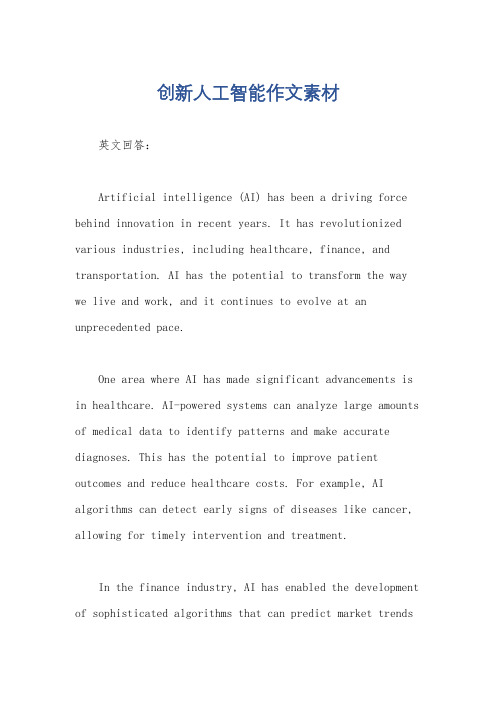
创新人工智能作文素材英文回答:Artificial intelligence (AI) has been a driving force behind innovation in recent years. It has revolutionized various industries, including healthcare, finance, and transportation. AI has the potential to transform the way we live and work, and it continues to evolve at an unprecedented pace.One area where AI has made significant advancements is in healthcare. AI-powered systems can analyze large amounts of medical data to identify patterns and make accurate diagnoses. This has the potential to improve patient outcomes and reduce healthcare costs. For example, AI algorithms can detect early signs of diseases like cancer, allowing for timely intervention and treatment.In the finance industry, AI has enabled the development of sophisticated algorithms that can predict market trendsand make investment decisions. These algorithms can analyze vast amounts of financial data in real-time, helping investors make informed decisions and maximize their returns. AI-powered chatbots are also being used in customer service, providing instant and personalized support to customers.Transportation is another sector that has been greatly impacted by AI. Self-driving cars, powered by AI, have the potential to make our roads safer and more efficient. These vehicles can analyze their surroundings, navigate traffic, and make split-second decisions to avoid accidents. Additionally, AI is being used to optimize logistics and supply chains, reducing costs and improving delivery times.Despite these advancements, there are also concerns surrounding AI. One major concern is the potential impact on jobs. AI has the ability to automate many taskscurrently performed by humans, which could lead to job displacement. However, it is important to note that AI also has the potential to create new jobs and industries. As AI continues to evolve, it is crucial for society to adapt andreskill the workforce to ensure a smooth transition.In conclusion, artificial intelligence has broughtabout significant innovation across various industries. It has the potential to improve healthcare outcomes, enhance financial decision-making, and revolutionize transportation. While there are concerns surrounding job displacement, itis important to embrace AI and harness its potential forthe betterment of society.中文回答:人工智能(AI)近年来一直是创新的推动力。
人工智能的英文作文大全

人工智能的英文作文大全Artificial Intelligence: A Comprehensive Collection of English EssaysIntroductionArtificial Intelligence (AI) has emerged as a revolutionary technology, transforming various industries and aspects of our lives. In this collection of English essays, we will explore different facets of AI, including its definition, applications, benefits, challenges, and ethical considerations. Join us on this intellectual journey as we delve into the world of AI and its implications for society.Essay 1: What is Artificial Intelligence?In this essay, we will provide a comprehensive overview of AI, its definition, and its underlying principles. We will explore the different types of AI, such as narrow AI and general AI, while discussing the capabilities and limitations of each. Additionally, we will examine the historical development of AI and its current state.Essay 2: Applications of Artificial IntelligenceThis essay will focus on the wide-ranging applications of AI in various sectors. From healthcare to finance, transportation to entertainment, we will explore how AI is revolutionizing these industries. We will discuss real-life examples of AI implementation and the impact it has on improving efficiency, accuracy, and decision-making processes.Essay 3: Benefits of Artificial IntelligenceIn this essay, we will delve into the advantages and benefits that AI brings to society. We will highlight how AI can automate repetitive tasks, enhance productivity, and improve overall quality of life. Furthermore, we will analyze how AI is driving innovation, generating new job opportunities, and fostering economic growth.Essay 4: Challenges and Limitations of Artificial IntelligenceWhile AI presents numerous opportunities, it also poses challenges and limitations. This essay will address concerns regarding privacy, security, and the ethical implications of AI. We will explore the potential risks associated with AI, such as job displacement and algorithmic biases, and discuss strategies to mitigate these challenges.Essay 5: Artificial Intelligence and EthicsEthics play a vital role in the development and deployment of AI. In this essay, we will examine the ethical considerations surrounding AI, including transparency, accountability, and fairness. We will discuss how AI algorithms should be designed to avoid biased outcomes and respect ethical standards, establishing a trustworthy and responsible AI ecosystem.Essay 6: The Future of Artificial IntelligenceThe final essay will explore the future prospects and possibilities of AI. We will discuss emerging trends in AI research, such as explainable AI and AI-driven robotics. Additionally, we will predict the potential societal impact of AI advancements and its integration into everyday life.ConclusionArtificial Intelligence has become an inseparable part of our modern world. Through this collection of English essays, we have examined different aspects of AI, from its definition and applications to its ethical considerations and future prospects. It is crucial for us to foster a balanced approach towards AI, harnessing its benefits while addressing the challenges and ensuring ethical implementation. As AI continues to evolve, it is up to us to shape its trajectory and maximize its positive impact on society.。
- 1、下载文档前请自行甄别文档内容的完整性,平台不提供额外的编辑、内容补充、找答案等附加服务。
- 2、"仅部分预览"的文档,不可在线预览部分如存在完整性等问题,可反馈申请退款(可完整预览的文档不适用该条件!)。
- 3、如文档侵犯您的权益,请联系客服反馈,我们会尽快为您处理(人工客服工作时间:9:00-18:30)。
摘要:人工智能(Artificial Intelligence) ,英文缩写为AI。
它是研究、开发用于模拟、延伸和扩展人的智能的理论、方法、技术及应用系统的一门新的技术科学。
人工智能是计算机科学的一个分支,它企图了解智能的实质,并生产出一种新的能以人类智能相似的方式做出反应的智能机器,该领域的研究包括机器人、语言识别、图像识别、自然语言处理和专家系统等。
专家系统是人工智能应用研究的主要领域。
70年代中期,专家系统的开发获得成功。
正如专家系统的先驱费根鲍姆(Feigenbaum)所说:专家系统的力量是从它处理的知识中产生的,而不是从某种形式主义及其使用的参考模式中产生的。
这正符合一句名言:知识就是力量。
80年代,专家系统在全世界得到迅速发展和广泛应用。
本文中介绍了人工智能的概念,分类,特点以及人工智能的研究的发展及其现状。
由此引出专家系统的基本概念及主要特点。
最后,通过查阅各种资料以及自己的理解分析,对专家系统的主要应用做具体分析。
阐述了将计算机人工智能的专家系统理念与审计实务相结合并提出审计工具智能化的设想,同时,具体分析了构建审计专家系统可供利用的计算机应用技术,并初步建立了审计专家系统的模块体系。
关键词:人工智能,专家系统,审计专家系统
Expert system outline and application
Abstract :The artificial intelligence (Artificial Intelligence), English abbreviation is AI.It is the research, the development uses in simulating, extending and expands human's intelligence theory, the method, technical and an application system new technical science. The artificial intelligence is a computer science branch, it attempts the understanding intelligence the essence, the parallel intergrowth delivers one kind newly to be able to make the response by the human intelligence similar way the intelligent machine, this domain research including robot, language recognition, pattern recognition, natural language processing and expert system and so on.
The expert system is the artificial intelligence applied research main domain.The 70's intermediate stages, the expert system development obtains successfully.Just like expert system pioneer Fei Genbao mho (Feigenbaum) said that,The expert system strength is in the knowledge which processes from it produces, but is not produces from some formalism and in the use reference pattern.This is conforming to a famous saying: The knowledge is a strength.The 80's, the expert system obtains the rapid development and the widespread application in the world.
In this article introduced the artificial intelligence concept, the classification, the characteristic as well as the artificial intelligence research development and the present situation.From this draws out the expert system the basic concept and the main characteristic.Finally, through consults each kind of material as well as own understanding analysis, makes the concrete elaboration to the expert system main application.Introduced unifies the computer artificial intelligence expert system idea and the audit practice and proposed the audit tool intellectualization tentative plan, simultaneously, analyzed the construction to audit the expert system specifically to be possible to supply the use the computer application technology, and established initially has audited the expert system the module system.
Key word: Artificial intelligence,Expert system,Auditing Expert System
人工智能的发展
作者XXX
南京XXX大学XXX学院南京
摘要计算机科学和人工智能将是21世纪逻辑学发展的主要动力源泉,并且在很大程度上将决定21世纪逻辑学的面貌。
这些年来,人工智能在计算机科学、逻辑学等领域已取得重大成就,但离真正的人类智能还相差甚远。
现在是网络时代,人工智能科学要在学科交叉研究中实现人工智能的发展与创新,会更加关注认知科学与人工智能之间的交叉渗透;要利用现实生活中复杂网络的小世界模型发展人工智能。
关键词人工智能;发展现状;发展潜力;发展方向
The development of artificial intelligence
Author XXX
Nanjing University ofXXX Nanjing
(E-mail: XXX)
Abstract—Computer Science and Artificial Intelligence will be the development of logic in the 21st century. They are the main source of power, and they will determine the face of logic in the 21st century. In recent years, artificial intelligence has made significant achievements in the computer science, logic and other fields, but it is far from the real human intelligence. Now, it is the Internet Age, artificial intelligence science that in interdisciplinary research and innovation to achieve the development of artificial intelligence will pay more attention between cognitive science and artificial intelligence infiltrated; making use of real-life small-world model of complex network of artificial development Smart.
Keywords—Artificial intelligence; Status of development; Potential of development; Direction of development。
